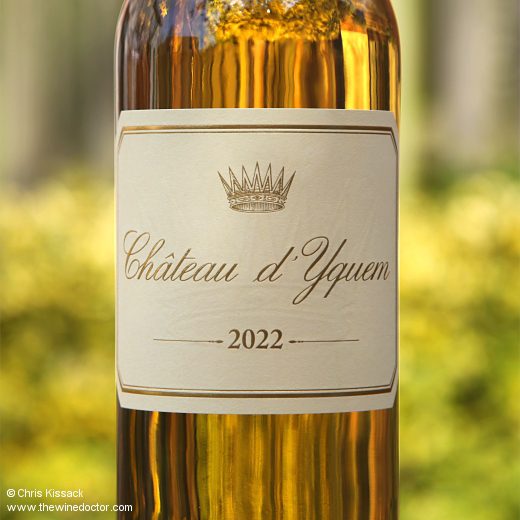Chateau d’Yquem: Tasting & Drinking
Château d’Yquem is certainly a special estate, ranking among the top five white vineyards of France, as documented by the renowned gastronome Curnonsky. He placed it alongside Montrachet in Burgundy, Château Chalon in the Jura, Château Grillet in the Rhône Valley (and now in the possession of Frédéric Engerer of Latour, of course) and where else but Nicolas Joly’s Clos de la Coulee de Serrant in Savennières, in the Loire Valley. But Yquem’s fame rests not just on this one observer; it has long attracted many other famous names, including – as I have already detailed in this profile – American ambassador Thomas Jefferson, a well known lover of France’s wines. Jefferson ordered several hundred bottles of the 1784, as well as securing some 1787 for his president George Washington. When he became president himself, no doubt he continued drinking Yquem. And suitable homage is also paid in the form of the written word, from the pens of Alexandre Dumas, Marcel Proust and Jules Verne among others. I can’t help thinking it may also have cropped up somewhere in one of the Hannibal Lecter stories. Perhaps that’s when you know you have really made it!
Château d’Yquem is, it seems, history, poetry and perhaps life itself rolled into a wine, bottled and sealed with a cork. And yet I confess on my first significant exposure to Château d’Yquem, as I have already declared in the introduction to this profile, I failed to comprehend this wine’s exalted reputation; it seemed to me that I had experienced many other more characterful, more voluptuous, more thrilling wines, and I was left in a state of bemusement. It took a little while for me to see the light; like many great wines, Château d’Yquem’s reputation rests not on a flashy or voluptuous style, but rather a fabulous elegance, balance, precision and poise. Yes, the wines can have exuberant fruit as well – witness the 2011, 2018 and 2022 vintages, for example – but on the whole the wines of Château d’Yquem are ones that can dance lightfooted across the palate when young, and yet in doing so display the structure that will enable long aging in the cellar. Quite simply, these are – increasingly so in the most recent of vintages – fabulous wines. And as a consequence this is, as perhaps this most detailed of profiles makes plain, one of the wines I adore most in all Bordeaux.

I don’t recall a truly disappointing wine here; clearly quality varies from one year to the next, but the overall level is very high. A few favourite vintages of the Sauternes grand vin in recent times include 2022, 2021, 2020, 2019, 2017, 2016, 2015, 2014, 2011, 2010, 2009 and 2007. With a little more bottle age, 2001, 1997, 1990 and 1988 are obvious superstars. Whatever the vintage on the label though, one thing is sure; the quality always seems to shine through, even in a weaker vintage such as 2002. This is one of Bordeaux’s greatest estates. (5/1/05, updated 26/9/06, 25/9/12, 16/12/12, 14/8/22)
Please log in to continue reading: